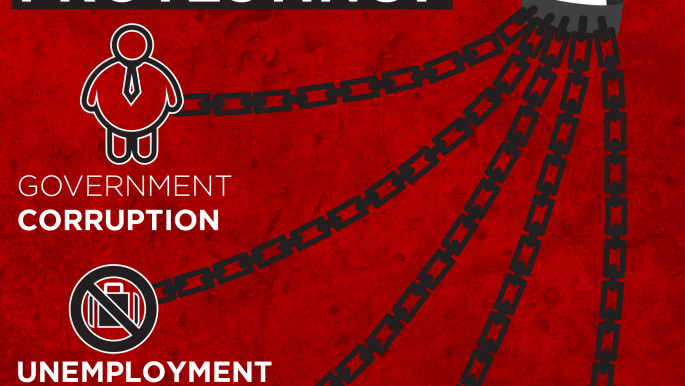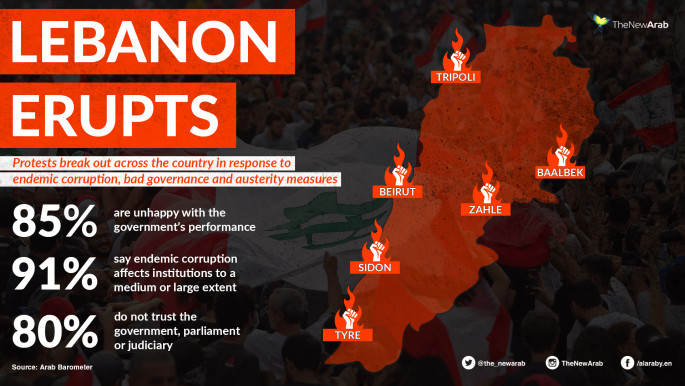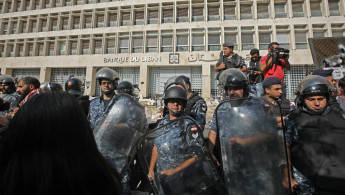Lebanon's Ponzi scheme economy is broken. Protesters want the wealthy 1% to foot the bill
Lebanon's Ponzi scheme economy is broken. Protesters want the wealthy 1% to foot the bill
Dispatch: Lebanon's already crippled economy has plunged into crisis amid widespread protests in the country. Protesters want a radical solution
5 min read
Lebanon is suffering from fuel, medicine and cash shortages [Getty]
Lebanon's central bank on Monday vowed to provide dollars at the official rate for firms that import fuel, medicine and wheat to alleviate the worse financial crisis since the war-torn 1980s.
Central bank (BDL) chief Riad Salameh said Monday that the Lebanese Pound peg to the dollar would remain stable and that there would be no haircut on customers' bank deposits.
He stopped short of instituting capital controls, saying "that will never happen".
Banks shut their doors for two weeks following a nation-wide protest movement that began on October 17. Since they reopened, bank staff have faced abuse from customers angered by restrictions on their access to their cash.
Banks have responded to the crisis in a haphazard manner, quietly lowering withdrawal limits, declining foreign currency accounts conversions and avoiding transfers abroad to ration US dollar reserves and prevent capital flight.
The Union of Bank Employees announced a general strike over safety concerns to begin on Tuesday.
The mass protest movement brought about the resignation of Prime Minister Saad al-Hariri at the end of October lit a powder keg long in the making.
According to Sami Halabi, director of the research and policy firm Triangle in Beirut, the Lebanese economy is "an enormous Ponzi scheme that is now broken."
 |
| Read more: Lebanon students skip class to join protest movement |
Like a pyramid, the system held up only as long as there was a constant supply of new money at the base.
Lebanese citizens have been pawns in this game as investors were promised large profits at little to no risk. Banks periodically increased the interest rate on deposits to attract dollar savings and depositors subscribed readily to interest rates way above global market levels.
In a country where over 40 percent of bank assets are owned by politicians, that meant big profits for those in power.
But the banks' assets are now dwarfed by their liabilities as dollar reserves have run low and banks stopped distributing foreign currency in ATMs.
The unbalance between demand and supply is feeding a sprawling foreign currency black market. An online conversion from dollars to Lebanese pounds yields a 1,514.5 conversion – the upper limit of the pound peg established at 1,500 to the dollar in 1997. At currency exchange houses, however, the rate ranges from 1,525 to 1,540. Some reports rated one dollar buying as much as 1,800 pounds on Friday.
This is because hard currency – as opposed to the fictional amount that sits in virtual space – has become a rare good.
Worsening an already dysfunctional situation, those able to get their hands on dollars are changing them at currency exchange stores for profit.
 |
| Read more: Nobody knows Lebanon's problems better than its women |
"Opportunity out of crisis is a Lebanese modus operandi," Halabi told The New Arab, adding that this was impacting "terribly" on the economic situation.
"You are shooting yourself in the foot," he said.
First to suffer are businesses that sell in Lebanese pounds but buy in dollars, like petrol stations. A Facebook video circulated on social media showed how some gas stations no longer accepting payments in Lebanese pounds.
Fuel shortages have already yielded some closures, according to the Syndicate of Gas Station Owners. In Tyre, all gas stations remained closed on Monday, the state-run National News Agency reported.
 |
| Read more: Why feminist issues are driving Lebanon's protests |
Local middle-range businesses are also taking a hit. A retail business owner in the popular neighbourhood of Gemmayze complained that business dwindled for years and tanked as the protest movement began. While he has had almost no income for three weeks, he must pay in dollars his outstanding merchandise shipments and face hard costs including rent and workers' salaries.
So far, no solution has been put forward to stave off the economic crisis and form a new government.
Citizens have woken up to the scheme of misappropriated public funds and are vehemently demanding that the same political class that has been profiting for decades from financial mismanagement now foots the bill. This will require lifting banking secrecy, a demand protesters have brought to the forefront.
The Lebanese politicians who created the problem may be the only ones able to provide a solution. International banks are understandably unwilling to step in and save the Lebanese economy by buying its banks and recapitalising them. Folding the banks that have gone broke into the central bank also might not be a viable option, as it sits on the premise that BDL holds vast reserves. Tellingly, the central bank keeps the exact figure under wraps.
One way out of the crisis could be for everyone – including the average Lebanese – to take a 'haircut'.
But Lebanese citizens, who are preparing a general strike and mass demonstration in front of the Lebanese parliament on Tuesday, seem unlikely to acquiesce.
Federica Marsi is a journalist based in Beirut, Lebanon.
Follow her on Twitter @federica_marsi



